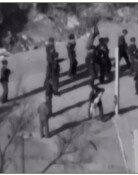The Prisoners Dilemma

You and your accomplice in crime have been captured by the police and confined in separate rooms, making communication between the two of you impossible. The police is unable to prove your guilt, and can only convict you of a minor offense that will put you in prison for a year. At that point, the police offers you and your accomplice a compromise: If you testify to your accomplices crime, but your accomplice remains silent, you will be released and your accomplice will be sentenced to three years in prison. If you both admit your guilt, youll both receive two-year sentences. And if you both exercise your right to remain silent, both of you will receive sentences of one year only. They explain that your accomplice is being offered the same deal, but that you cannot know what he or she decides until you make your own decision. What would you do?
The best choice for you and your accomplice would be to remain silent and receive one-year sentences. But in order to take this choice, you must have faith that your partner will not testify against you. The problem is that you and your accomplice both put your own interests before the others, so there is no such faith to fall back on. If you refuse to testify and your partner talks to the police, youll end up in prison for three years. On the other hand, if you confess and your accomplice remains silent, youll go free. If your partner talks as well, youll still receive just two years in prison. Naturally, your choice is to confess.
This is the essence of the prisoners dilemma.
In a situation involving conflicting interests, the prisoners dilemma dictates that the best rational strategy for the person who pursues his/her own interests when his/her counterpart is also protecting their own best interests is betrayal rather than cooperation.
The prisoners dilemma is a representative example of Game Theory. It was invented in 1950 by Merrill Flood and Melvin Dresher, two scientists of the first American think tank known as the RAND Corporation, and later refined by RAND Corporation advisor Albert W. Tucker.
William Poundstones book, also entitled Prisoners Dilemma and originally published in 1992, is at once the biography of John von Neumann, the genius mathematician who invented Game Theory, and a socio-historical record of the role played by Game Theory in the Cold War and the nuclear arms race.
Game Theory is the study of dilemmas among rational entities who distrust one another. The most telling example of the prisoners dilemma is the nuclear arms race that took place between the United States and the Soviet Union during the Cold War era that followed the end of the Second World War. Each country embarked on the production of hydrogen bombs, which far exceeds atomic bombs in destructive power. However, hydrogen bombs are costly to make, thus leading to relative poverty for the country that produces them as well as intensifying the peoples sense of insecurity. Although there was little if any gain to be made on either sidein fact, both sides would have profited simply by postponing the production of hydrogen bombsthe U.S. and the Soviet Union entered the nuclear arms race out of a desire for military superiority or the fear that failing to possess the hydrogen bomb would result in relative vulnerability. The essence of this dilemma is that competition would continue without either side being able to achieve clear dominance.
Von Neumanns claim that the U.S. must wage preventive war against the Soviet Union, which had yet to produce the hydrogen bomb at that point, in order to obviate such a dilemma could be seen as an irony distinctive to the period.
The prisoners dilemma can be found in everyday life as well as in international relations. Its most commonly encountered form is the free ride dilemma. Buying a ticket when one rides the subway not only reduces tax by contributing to the local governments finances but also allows the public to benefit from better facilities. But the free rider betrays this trust and disappears into the anonymous crowd.
Poundstone writes that the ability to regard the enemy as an ally would make the common prisoners dilemma a far less headache-inducing game. At the end of the first chapter, he asks whether there is a way to promote the common good in the prisoners dilemma. He provides his own answer in the books final chapter:
Von Neumann was probably correct in his view that the long-term survival of humankind depended on our ability to devise a way of promoting more cooperation than we are currently engaged in.
mindy@donga.com
Headline News
- Pres. Yoon refuses impeachment documents for a week
- Debate over Lee’s participation causes friction in government consultative body
- Food and dining prices could increase en masse next year
- Foreign couple borrowed over $2 million to buy a Seoul house
- One-third of Japanese companies keep workers employed until 70







